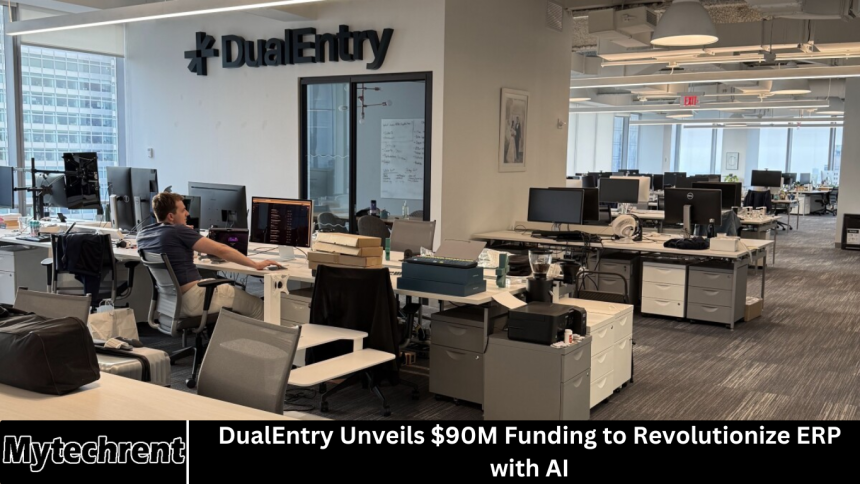In a significant move that is poised to reshape enterprise resource planning (ERP) systems, DualEntry, a rising star in enterprise software, has officially emerged from stealth mode, announcing $90 million in funding.
- The Evolution of ERP and the Need for Modernization
- DualEntry Emerges from Stealth with $90M in Funding
- How DualEntry Uses AI to Revolutionize ERP
- 1. Automated Data Entry and Reconciliation
- 2. Intelligent Forecasting and Analytics
- 3. Personalized AI Assistants
- 4. Enhanced Compliance and Risk Management
- The Benefits of Modern AI-Driven ERP
- Market Potential and Industry Implications
- DualEntry vs. Traditional ERP Systems
- Leadership and Vision
- Challenges and Considerations
- The Future of ERP with AI
- Frequently Asked Question
- Conclusion
The startup aims to leverage artificial intelligence (AI) to modernize ERP systems, bringing automation, intelligence, and efficiency to an industry long dominated by legacy software.
This article explores how DualEntry plans to transform ERP with AI, the implications for businesses, and why this funding marks a major milestone in enterprise technology.
More Read: China’s New Tech Visa Draws India’s Attention, Sparking Discontent Among Locals
The Evolution of ERP and the Need for Modernization
Enterprise Resource Planning (ERP) systems are the backbone of many large and medium-sized organizations, integrating functions such as finance, supply chain, human resources, and customer relationship management.
However, despite their critical role, traditional ERP systems often struggle with inefficiencies, outdated interfaces, and rigid workflows.
Modern businesses demand more than just record-keeping—they require smart, predictive, and adaptive systems. AI and machine learning present an opportunity to bring ERP into the modern era, enabling:
-
Predictive analytics for better decision-making
-
Automation of repetitive tasks to save time and reduce errors
-
Enhanced reporting and insights for strategic planning
-
Improved scalability and flexibility for growing organizations
DualEntry’s entry into this space signals a shift in the market. By combining AI with ERP, the company aims to eliminate bottlenecks and inefficiencies that have plagued traditional systems for decades.
DualEntry Emerges from Stealth with $90M in Funding
DualEntry’s $90 million funding round, led by top-tier venture capital firms, underscores investor confidence in AI-driven ERP modernization. The funding will be used to:
-
Accelerate product development: Enhancing AI capabilities and expanding ERP functionalities
-
Expand market reach: Targeting mid-to-large enterprises seeking ERP modernization
-
Strengthen talent acquisition: Recruiting top AI and ERP experts to scale the platform
Industry experts view this funding as a recognition that AI-integrated ERP solutions are the next frontier for enterprise software. DualEntry joins a growing number of startups aiming to disrupt the traditional ERP market with intelligent automation.
How DualEntry Uses AI to Revolutionize ERP
The core of DualEntry’s value proposition lies in its use of AI technologies, including machine learning, natural language processing (NLP), and advanced data analytics. Here’s a breakdown of how AI transforms ERP processes:
1. Automated Data Entry and Reconciliation
Manual data entry has long been a pain point for businesses using ERP systems. DualEntry leverages AI to:
-
Automatically capture and categorize financial transactions
-
Reconcile accounts in real-time
-
Reduce human errors, improving data integrity
This not only saves time but also reduces operational risk, a critical factor for finance and accounting teams.
2. Intelligent Forecasting and Analytics
Using machine learning algorithms, DualEntry can analyze historical business data to generate accurate forecasts. This empowers companies to:
-
Predict demand trends and inventory needs
-
Optimize supply chain and resource allocation
-
Make informed strategic decisions with confidence
By turning raw data into actionable insights, DualEntry enables companies to stay ahead in competitive markets.
3. Personalized AI Assistants
DualEntry integrates AI-powered assistants that can interact with users in natural language. Employees can:
-
Query financial reports instantly
-
Receive recommendations for optimizing workflows
-
Automate routine tasks like invoice approvals
This reduces the learning curve for employees and increases overall productivity.
4. Enhanced Compliance and Risk Management
AI enables proactive risk detection by monitoring transactions, identifying anomalies, and ensuring compliance with regulations. This is particularly valuable for industries like finance, healthcare, and manufacturing, where regulatory scrutiny is high.
The Benefits of Modern AI-Driven ERP
The integration of AI into ERP systems offers numerous advantages:
-
Efficiency: Automation reduces time spent on repetitive tasks.
-
Accuracy: AI minimizes errors in financial and operational data.
-
Scalability: Businesses can handle growing data volumes seamlessly.
-
Insight: Predictive analytics support better decision-making.
-
User Experience: AI assistants simplify complex workflows.
For companies struggling with legacy ERP systems, DualEntry presents a viable path to modernization, unlocking significant operational and financial benefits.
Market Potential and Industry Implications
The ERP market is estimated to exceed $100 billion globally, and AI integration represents a major growth segment. Analysts predict that AI-driven ERP solutions will see accelerated adoption due to:
-
Rising demand for digital transformation in enterprises
-
Pressure to reduce operational costs while improving efficiency
-
The need for real-time insights in fast-changing markets
DualEntry’s approach positions it to capture a substantial share of this market by addressing pain points that have persisted for decades.
DualEntry vs. Traditional ERP Systems
Compared to traditional ERP solutions like SAP, Oracle, and Microsoft Dynamics, DualEntry offers several distinct advantages:
| Feature | Traditional ERP | DualEntry AI-Driven ERP |
|---|---|---|
| Data Entry | Manual, prone to errors | Automated, AI-powered |
| Forecasting | Historical, static | Predictive, dynamic |
| User Experience | Complex, requires training | AI assistants, intuitive |
| Scalability | Limited by legacy infrastructure | Cloud-native, scalable |
| Compliance | Manual audits | AI-powered risk detection |
This comparison highlights why businesses seeking modern ERP solutions are increasingly looking at AI-first platforms like DualEntry.
Leadership and Vision
DualEntry’s leadership team brings together ERP veterans, AI researchers, and enterprise software experts. Their vision focuses on creating a platform that is:
-
User-centric, making ERP accessible to non-technical users
-
Flexible, capable of adapting to different industries and workflows
-
Future-proof, integrating emerging AI capabilities to stay ahead of competitors
Investors cite the team’s experience and vision as a key reason for backing the company’s $90 million funding round.
Challenges and Considerations
While AI-driven ERP offers enormous potential, challenges remain:
-
Data security: Enterprises must ensure sensitive data is protected.
-
Integration: Migrating from legacy systems requires careful planning.
-
Change management: Employees may need support to adapt to AI-assisted workflows.
DualEntry’s success will depend on how well it addresses these challenges while delivering tangible value to customers.
The Future of ERP with AI
The rise of AI-driven ERP solutions signals a broader trend: the digitization and intelligence of enterprise operations. As AI capabilities mature, we can expect:
-
Greater automation of end-to-end business processes
-
Real-time insights and decision-making
-
Personalized workflows for employees and teams
-
Enhanced collaboration across departments and geographies
DualEntry is at the forefront of this revolution, and its $90 million funding provides the resources to accelerate innovation in the ERP space.
Frequently Asked Question
What is DualEntry?
DualEntry is an emerging enterprise software company focused on modernizing ERP (Enterprise Resource Planning) systems using artificial intelligence (AI). The platform aims to automate workflows, improve data accuracy, and provide predictive insights for businesses.
How much funding did DualEntry raise?
DualEntry recently raised $90 million in funding in its latest round. This investment will be used to accelerate product development, expand market reach, and hire top AI and ERP talent.
Why is DualEntry important for ERP modernization?
Many traditional ERP systems are outdated, complex, and inefficient. DualEntry leverages AI to automate tasks, provide predictive analytics, and enhance user experience, making ERP systems smarter and more adaptable for modern businesses.
How does DualEntry use AI in ERP?
DualEntry integrates AI technologies like machine learning, natural language processing, and predictive analytics to:
- Automate data entry and reconciliation
- Generate accurate forecasts
- Provide intelligent recommendations via AI assistants
- Monitor compliance and manage risks
What industries can benefit from DualEntry’s AI-driven ERP?
DualEntry’s solutions are ideal for industries that rely heavily on ERP systems, such as:
- Finance and accounting
- Manufacturing and supply chain
- Healthcare
- Retail and e-commerce
- Professional services
How is DualEntry different from traditional ERP systems?
Unlike legacy ERP platforms, DualEntry offers:
- Automated processes instead of manual workflows
- Predictive analytics rather than static reports
- User-friendly AI assistants
- Cloud-native scalability for growing businesses
What is the future outlook for DualEntry?
With its recent $90M funding, innovative AI technology, and experienced leadership team, DualEntry is positioned to redefine ERP systems. It aims to accelerate adoption of AI-driven ERP, helping businesses improve efficiency, accuracy, and strategic decision-making.
Conclusion
DualEntry’s emergence from stealth with $90 million in funding marks a pivotal moment for the ERP industry.
By integrating AI into ERP systems, the company is addressing long-standing inefficiencies, delivering smarter analytics, and transforming how businesses manage operations.
For organizations seeking to modernize their enterprise software and gain a competitive edge, AI-driven ERP platforms like DualEntry represent the future—efficient, intelligent, and adaptive.








